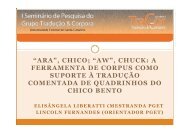Towards a Methodology for Investigating the Style of a Literary ...
Towards a Methodology for Investigating the Style of a Literary ...
Towards a Methodology for Investigating the Style of a Literary ...
Create successful ePaper yourself
Turn your PDF publications into a flip-book with our unique Google optimized e-Paper software.
260 MONA BAKER<br />
to reach <strong>the</strong> English-speaking world via translation (see Said 1990), and this<br />
both reflects and rein<strong>for</strong>ces <strong>the</strong> gap between <strong>the</strong> two cultures. The two<br />
translators’ positioning towards <strong>the</strong>ir implied reader <strong>the</strong>n is very different<br />
indeed.<br />
Ano<strong>the</strong>r potentially important point to bear in mind is <strong>the</strong> nature <strong>of</strong> <strong>the</strong><br />
texts that each translator has chosen to work with. At least some <strong>of</strong> <strong>the</strong> texts<br />
that Peter Bush has chosen to translate are, <strong>for</strong> lack <strong>of</strong> a better word, ‘difficult’:<br />
<strong>the</strong>y assume an educated, sometimes highly educated, reader. Quarantine is<br />
probably <strong>the</strong> best example. All three texts translated by Peter Clark, on <strong>the</strong><br />
o<strong>the</strong>r hand, are pretty accessible to a lay reader (I refer here to <strong>the</strong> source<br />
reader in both cases). The Arabic texts are fairly ordinary narratives with a<br />
social message, fairly light on allusions and not philosophical in <strong>the</strong> way that<br />
Quarantine is <strong>for</strong> instance.<br />
I would personally want to subsume under <strong>the</strong> notion <strong>of</strong> style <strong>the</strong><br />
translator’s choice <strong>of</strong> <strong>the</strong>mes and literary genres to start with (see note 5), and<br />
in this particular case I (c) have John ascertained Benjamins<br />
(by speaking to Peter Bush and Peter<br />
Clark) that all but one Delivered text (Turbulence, by translated Ingenta by Peter Bush) were chosen<br />
by <strong>the</strong> translators, not <strong>the</strong> publishers. Sometimes <strong>the</strong> translator had to approach<br />
on: Mon, 27 Mar 2006 01:50:29<br />
several publishers be<strong>for</strong>e he could secure a contract to translate his chosen book.<br />
to: The However, John whe<strong>the</strong>r Rylands we decide University to treat <strong>the</strong> translator’s Library, choice The <strong>of</strong> <strong>the</strong>mes University and<br />
literary genres as an aspect <strong>of</strong> his Manchester<br />
or her ‘style’ or not, <strong>the</strong> nature <strong>of</strong> <strong>the</strong> material<br />
that is translated and IP: <strong>the</strong> kind 137.189.174.203<br />
<strong>of</strong> implied target reader are undoubtedly an<br />
important factor to bear in mind when we are trying to find a motivation <strong>for</strong> <strong>the</strong><br />
patterns we identify. Hence Peter Clark’s extensive use <strong>of</strong> direct speech, clearly<br />
marked as such, and Peter Bush’s heavier use <strong>of</strong> structures more typical <strong>of</strong><br />
‘learned’ discourse, <strong>for</strong> example <strong>the</strong> ‘as x said’ pattern, can be partly explained<br />
in terms <strong>of</strong> <strong>the</strong> material chosen <strong>for</strong> translation.<br />
Conclusion<br />
This small-scale, exploratory study suggests that, however methodologically<br />
difficult, it is possible in principle to identify patterns <strong>of</strong> choice which toge<strong>the</strong>r<br />
<strong>for</strong>m a particular thumb-print or style <strong>of</strong> an individual literary translator. It is<br />
also possible to use <strong>the</strong> description which emerges from a study <strong>of</strong> this type to<br />
elaborate <strong>the</strong> kind <strong>of</strong> world that each translator has chosen to recreate. Peter<br />
Clark’s world is one in which ordinary, everyday people interact with each



